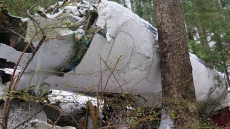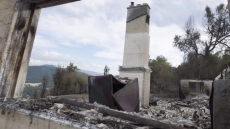EDMONTON — Alberta's environment minister says results from a national testing program show the province is on track to have the worst air quality in Canada.
Shannon Phillips said high levels of fine particles in central Alberta pose no immediate health risk, but the findings require immediate action from the provincial government.
"This includes a review of technology that could be used to reduce harmful emissions," she said after the results were released Wednesday. "We are also looking at the licence review process to see how we can ensure industrial emitters are meeting the new stricter national standards."
She promised a plan to address the situation in about a month.
Phillips said the government is also considering whether to introduce emissions standards for vehicles as part of its ongoing effort to rewrite Alberta's climate change policy.
The results show the Red Deer region has exceeded levels for fine particulate matter. Those particles form in the presence of sulphur and nitrogen dioxides, the main components of smog.
Although their origin hasn't been pinpointed, the particulates are thought to come from a combination of industrial sources — especially coal-fired power generation — and vehicles.
Four other regions of the province — the lower Athabasca, upper Athabasca, North Saskatchewan and South Saskatchewan — are approaching the same levels seen around Red Deer. Those zones must develop plans to keep their levels from getting worse.
"We are on track to have the worst air quality in Canada," Phillips said.
The measurements are an attempt to gauge general air quality in an area, not to provide health guidance.
The results, the first from testing initiated by the country's environment ministers in 2012, also found significant levels of ozone throughout the province.
The report only looked at particulates and ozone and did not measure for contaminants such as mercury or polycyclic aromatic hydrocarbons, which are considered highly toxic.
However, particulates are capable of being absorbed into the body through breathing. They are believed to be linked to asthma, lung cancer, cardiovascular disease, respiratory diseases, premature delivery and birth defects.
Ozone, while naturally occurring in the upper atmosphere, is thought to harm respiratory function at ground level.
Air-quality concerns were also recently expressed for an industrial area northeast of Edmonton, where a U.S. lab found short-lived plumes of highly toxic chemicals such as benzene.
Phillips was cautious about the possibility of expanding Alberta's air monitoring.
"What we're focused on is preparing the management responses to this new set of ... standards."
She said the government is considering its overall approach to monitoring as part of a new environmental policy framework.
The Canadian Association of Physicians for the Environment said Wednesday's results are no surprise and called for the phase-out of coal-fired power generation in the province.
“There are viable economic, non-polluting alternatives that can be brought in fairly quickly to produce rapid improvements in air quality,” said spokesman Dr. Joe Vipond.





